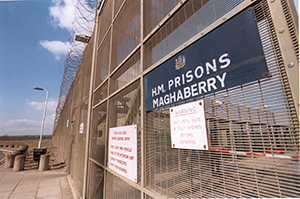Change needed at Maghaberry
 Inspection brands prison dangerous and expresses its concern for both prisoner and staff safety.
Inspection brands prison dangerous and expresses its concern for both prisoner and staff safety.
Inspectors from Her Majesty’s Inspectorate of Prisons and Criminal Justice Inspection Northern Ireland have labelled Maghaberry prison as one of the most dangerous they have ever seen in a recently published inspection report.
The report details the inspector’s findings from an unannounced inspection of Maghaberry prison that was carried out from 11th – 22nd May 2015. These comments echo those of an inspection report published in February 2006. The 2006 report found all the systems ensuring prisoner safety at Maghaberry were underdeveloped, that there was not enough work and training available for prisoners and that the ‘square houses’ were unsuitable and difficult to supervise.
Ultimately the 2006 report found that “Maghaberry was not providing Northern Ireland either with value for money, or with effective public protection” and it appears not much has changed in 10 years.
Maghaberry is Northern Ireland’s only high security Category A prison. Following the closure of Crumlin Road Gaol in 1996, Maghaberry prison became Northern Ireland’s adult committal prison and began to house non-paramilitary remand prisons.
The inspection process uses four tests to determine a healthy prison. These tests are focused on:
• safety: ensuring that prisoners, particularly the most vulnerable, are held safely;
• respect: ensuring the prisoners are treated with respect for their human dignity;
• purposeful activity: ensuring that prisoners are able, and expected to engage in activity that is likely to benefit them;
• resettlement: ensuring that prisoners are prepared for their release into the community and effectively helped to reduce the likelihood of reoffending.
There are four possible outcomes in relation to each of these points, these are: good, reasonably good, not sufficiently good and poor.
Safety
Using the healthy prison test system, the report found that Maghaberry prison offered its prisoners a poor standard of safety. It found that many prisoners claimed they felt unsafe, that levels of reported violence were rising and that there had been some serious and credible threats against staff. The report also notes how staff have also expressed fears about their own safety and the Department of Justice confirmed that on 31 January, four prison officers were injured during an incident with a prisoner.

At the last inspection in 2012, 26 recommendations were made to improve prisoner and staff safety. Of these 26, the report found that six of the recommendations had been achieved, five had been partially achieved but 15 had not been achieved.
Respect
Again the report found that when graded according to the healthy prison test, the level of respect for prisoners was poor. In contrast to the mostly good newer accommodation the older ‘square houses’ were poor with some areas dirty and neglected. With regards to staff-prisoner relationships the report found them to be respectful but distant. Prisoners are less satisfied with their relationships with staff than at the 2012 inspection.
At the last inspection, 41 recommendations were made in the area of respect. At this inspection, the report found that seven of these recommendations had been achieved, 16 had been partially achieved, 16 had not been achieved and two were no longer relevant.
Purposeful activity
The report found that when graded according to the healthy prison test the level of purposeful activity at the prison was poor. It claimed regime was curtailed on a daily basis and nearly all prisoners spent too much time in units with nothing to do.
Physical education provision is led effectively, with personalised fitness assessments and training programs available. However, the report claims that more needs to be done to involve older people and disabled prisoners.
At the last inspection, 13 recommendations were made to improve purposeful activity at the prison. None of the recommendations have been achieved with six having been partially achieved.
Resettlement
The inspectorate found the prison’s approach to resettlement to be reasonably good when judged against the healthy prison test. Good use was made of temporary release although the rationale for using it needs to be clearer.
The inspection in 2012 made 13 recommendations to improve resettlement, three of these recommendations have been achieved, one has been partially achieved and nine have not been achieved.
Concerns and recommendations
The report lists nine concerns it has about the prison and a raft of recommendations on how to address the problems. One of the concerns the report lists is the serious and imminent risk to the safety of staff and prisoners at Maghaberry prison.
To address this, the report recommends that urgent and decisive action is taken to strengthen the leadership of the prison, which must:
• provide visible reassurance and authority to staff and prisoners;
• reduce staff absenteeism;
• ensure basic safety process are in place;
• develop a security strategy relevant to the needs of the prison;
• prioritise the delivery of a predictable and decent regime;
• take robust steps to reduce the availability of illicit drugs and ensure the administration of prescribed medicines is carried out to Nursing and Midwife Council standards.
Response
In response to this inspection, the Northern Ireland Prison Service and the Department of Justice accepts or partially accepts all of the findings and is in the process of making changes to meet the inspections recommendations. To provide reassurance and authority to staff and prisoners, Phil Wragg has been appointed as Maghaberry’s Governor and the prison’s senior management team has also been refreshed.
In an attempt to ensure basic staff safety processes are in place, the prison will ensure that effective supervision of prisoners takes place in all areas, with staff being trained and appropriate risk assessment completed. A security strategy relevant to the needs of the prison is also in the process of being developed and implemented.
To prevent the abuse of diverted medication, new and robust medicine storage lockers will be installed and procedures will be put in place to administer medicines in accommodation areas, including the administration of supervised swallow. To tackle the problem of poorer outcomes for Catholic prisoners, independent and external research will be established to investigate and address the reasons for this.
Commenting on the Report, Prison Service Director General, Sue McAllister expressed her disappointment at the report’s findings but stressed that improvements are already underway with staff absenteeism falling sharply since May. Her words have been echoed by Justice Minister David Ford MLA who admitted that the report had flagged many serious issues that need to be addressed. “The conclusions of the Inspection Team show the scale of the challenge,” he said. “Maghaberry is a very complex prison. However in the six months since the inspection, the Prison Service has improved the immediate performance of Maghaberry.”
A follow up inspection took place during the first two weeks of January and the inspection team hopes to publish their findings before May.





